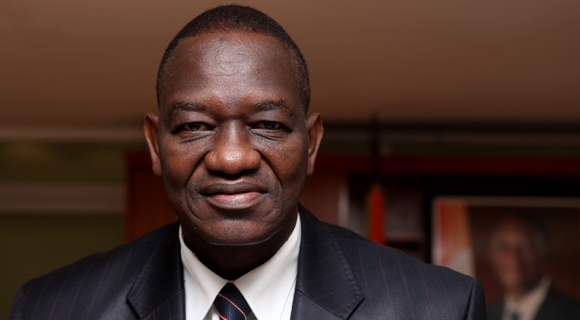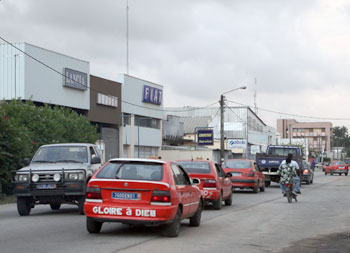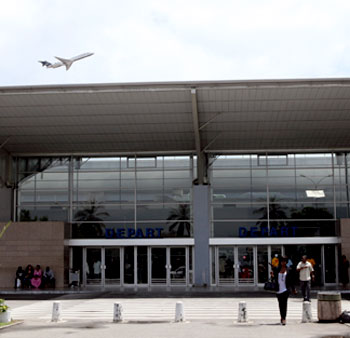Transport in Côte d’Ivoire
H.E. Gaoussou Toure, Minister of Transport of Côte d’Ivoire
Ministry of Transport of Côte d’Ivoire is responsible to implement the Government policy on transport. Roads are to be refurbished, taxi system as well – both are too old. Automobile and bus parks need to be renewed, too. Overall, the whole system of transport in Côte d’Ivoire is awaiting a change in the near future.
Interview with H.E. Gaoussou Toure, Minister of Transport of Côte d’Ivoire

What are the projects to revitalize the country?
First and foremost, the Ministry of Transport is responsible for implementing the government’s transport policy and is thus faced with a lot of challenges. In the wake of the post-electoral crisis, the transport sector (roads, railroads, maritime transport, and airways) have been left in shatters.
In general, the strategy is to eradicate the unions, create professional industry federations, and to professionalize the employees in the sector.
In a modern country that wants to continue to be the regional economic power, there are many things to be redone. A strong state is a state that cares for the disadvantaged and can guarantee the safety of goods and the people.
The taxi system is extremely old and disorganized. The taxis used for public transport are over 20 years old, which in effect causes pollution, smog, and creates greenhouse gases. These emissions are obviously unhealthy for the environment and its citizens. The taxis need to be replaced before anything else can be done in this sector. Also, the roads are completely unusable. As if the horrible state of the roads was not enough, the sector is heavily corrupted.

To deal with all of these issues, programs have been implemented to help re-organize the road sector. First of all, the unions need to disappear. A unionized environment is not business friendly if the mission focuses on creating maximum wealth in the transport sector. Unions are non-lucrative structures and therefore the goals are not the same. Unionized countries aim for wealth whereas their counterparts do not. Furthermore, the economic operator is a businessman so he does not want a union against himself. Unions do not depend on the Ministry of Transport but on the Ministry of Interior. The latter can sanction and eliminate them. Unions do not interest the Ministry of transport; they would rather do business with transport companies and for this reason, each department has transparent elections. These elections designate delegates to elect the president of the federation of transport companies in Côte d’Ivoire. The State supports this federation.
Another problem the transport sector faces is operator inexperience. Many people are employed in this sector but do not know how to do their job. The sector needs to help them by providing the necessary documents and guidance on how to succeed in this type of work. Along with other venues, the Ministry needs to provide training, explain how to fill out a credit report, etc.
Can you explain the role of the international investor in each of these developing sectors (maritime transport, road transport, railroad transport and aerial transport)?
Ground transport Sector:
One of the most important elements in the transport industry is the renewal of the automobile/bus parks. What the industry needs is to select three or four types of vehicles to continuously repair. This type of strategy will bring in consultants and partnerships with existing car dealerships.
…owning a car is almost impossible because the West-Africans cannot afford one. Our focus is to decrease this cost… this is why we believe that focusing on just specific types of models will facilitate this task.
Furthermore, owning an automobile is almost impossible because West-Africans cannot afford one. The focus is on decreasing cost by the scale of vehicles ordered, and this is why focusing on just specific types of models should facilitate this task. In order for all of this to work however, the industry needs enter into partnerships with big dealerships and then everything will fall into place.
There have already been huge investments of about 3,000 billion US dollars in highways that have helped build the Grand-Bassam highway, which is near the Ghana border. This highway is almost completed and will unite Côte d’Ivoire and Nigeria.
Financing:
It is important to note that the transport industry has a partnership with CFAO. We are also trying to work with financial banks and get approved for lines of credits. This is where the State gets involved. The state’s interference helps build trust between the banks and the operators. We have already signed with CFAO and also with the Ivorian society of banks in Côte d’Ivoire. Also, we should be signing with another important bank within the next fiscal year.
The automobile and the road sectors belong in one of the most important markets of Côte d’Ivoire, which explains the huge success with banks and dealerships. It should only improve with time.
Railroad transport sector:
Moreover, another branch of ground transport sector worth mentioning is the railroad system. Today, there are the railways connecting Abidjan to Burkina Faso and railways connecting Abidjan to Kaya. A new railroad is being discussed that would connect Abidjan to Niamey as well as a line that would start at San Pédro and end at the Malian border, more specifically, Sikasso. An interconnection Abidjan-Nigeria with Sikasso will allow the Malian from Nigeria to have a choice in direction.
Unfortunately, most of these railroads are very old and do not follow international standards and are the reason why the government decided to intervene in this sector. There has been a 150 billion US dollar investment in rehabilitating the Abidjan-Kaya railroad track and more investments are needed to fix the other tracks. However, rather than making huge investments, wise investments should be made to maintain the current railroads.

By investing in this sector, the supply capacity of electricity can be improved and exports can be made to neighboring countries like Liberia and Guinea. All of these projects are planned in partnership with the public and private sectors. Foreign investors can put these great plans in motion. All that is needed now are the best offers.
Aerial transport:
Right now there is no national airline carrier, however, in January the aerial sector is anticipating a new beginning. We have created a new company in partnership with the renowned airline Air France. Air France’s stake in the company is at 35% and the Ivorian state stake is at 65%. The objective is to democratize the air transport in Côte d’Ivoire and the sub-region. Once everything is back to normal, we want to build a large national company because the airline industry plays a very important role in the development strategy of Côte d’Ivoire.
Maritime transport:
The naval sector is also stagnant. The main concern is organizing this sector and developing it with the private sectors. The Ministry wants to start investing in water-buses to facilitate transport in 2012, a time when the country will be a construction zone. Driving will become a nightmare and therefore the Ministry is trying to come up with pro-active ideas to help people travel easier from district to district. Many companies are interested in these new projects. Our Ministry is planning on de-monopolizing the sector and thus inviting whoever wants to do business in Côte d’Ivoire. However, these water-buses will always float with the national flag on it. Even the Prime Minister will promote water-buses by using them the most he can. By 2040, Côte d’Ivoire is envisioned to be a great maritime nation.
It is important to note that even though it seems that the state is very involved in all these projects, the main role will be played by the private sector. It is necessary for the state to get involved and invest as needed, but the state will remain on the periphery.
Have you analyzed how many jobs all these new projects will create? Can you provide us with an estimate?
Speak with the Minister of Labor, Employment, and Solidarity regarding the issue of job creation. Within the next five years, the country is anticipating at least five hundred to six hundred thousand new jobs will be created.
Do you believe that it is safe for the international investor to invest in Côte d’Ivoire?

Circumstances have changed. Investors can testify that the situation has calmed down since the end of the crisis. In the past, access to justice was rare, however, today investors can say that access is improving. In Abidjan, one would think that the war finished 10 years ago because the people have picked up and re-built so quickly.
Today, the country plans to adopt an independent and impartial judiciary system to the citizens’ services. Once this is accomplished, the rest will follow. Savvy investors recognize the opportunity and will be looking to Côte d’Ivoire to invest their money. Believe it or not, Côte d’Ivoire will soon become the center of all businesses. Everyone is working together to jump-start the business environment.
Can you give us a brief description of SOTRA enterprise?
SOTRA is a public enterprise that the State deems very important for Côte d’Ivoire. The Ministry is doing its best to help jump-start the company again in this new economy. This company presents many employment opportunities and the Ministry is making huge investments to purchase at least 350 new buses by the end of the year. SOTRA will help service these buses and also negotiate new contracts.
All the proposals have been analyzed with consultants and the best proposal will be selected for SOTRA. Regardless of all that, SOTRA is the center of value today. In real estate, all that SOTRA has today makes it easy to set up plants without major real estate investment. This value is a bonus because it allows for advancement and putting structures in place. In the next two years, SOTRA will start hiring more employees.
Finally, the last international message is that Côte d’Ivoire is developing and all international partnerships and investors are welcome. The Ministry of Transport is always open to new contacts and partners in the transport industry.